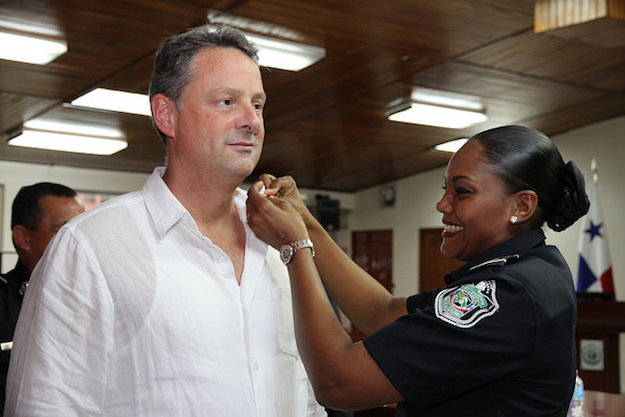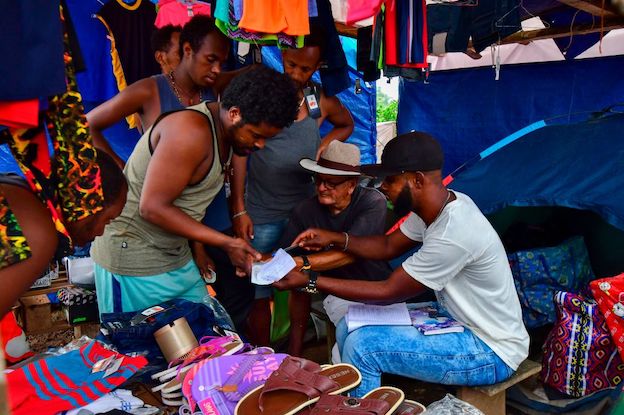My favorite John Feeley story is from the time we accompanied then-Vice President Joe Biden to Guatemala City on March 1, 2015. All of us on the vice president’s national security team were bouncing around in a motorcade to our next meeting, exhausted from the grueling demands of preparing and staffing such a trip. Feeley suddenly bundled his coat into a pillow and laid down to nap for the 15-minute drive to our next stop.
When I exclaimed, “I can’t believe you’re able to sleep in a moving motorcade,” he responded, “Marines have to learn to sleep anywhere,” and then nodded off.
Most everyone has a story about U.S. Ambassador John Feeley. From the time he went out of his way to get a surprise birthday cake for a staffer while on a separate grueling trip with then-Secretary of State Hillary Clinton, to the late night dinners he would host with Mexican diplomats and academics to debate policy. There is also the infamous index card to-do list he carried around during his time as Principal Deputy Assistant Secretary of State for Western Hemisphere Affairs. One day, some young Ph.D. researcher will write their dissertation on Feeley’s clever use of memes to break the tension in high stakes negotiations.
“Touchy,” was the clever call sign his fellow marines gave him (“Touchy” Feeley, get it?). He was a helicopter pilot before joining the foreign service and serving faithfully and dutifully under both Republican and Democratic administrations to become the U.S. ambassador to Panama. A seasoned diplomat who commands the respect of everyone around him, Feeley never took himself too seriously, but he was dead serious about the duty of public servants to remain apolitical.
To me, his way exemplified the constructive give and take that takes place between career professionals and the political leadership at the State Department. In Latin American diplomatic circles, he was admired by people of all political stripes, and we looked forward to the day when he and the rare others like him would assume the helm of U.S. diplomacy toward Latin America. The announcement of his resignation on Jan. 12 sent shockwaves throughout Washington and overseas. Now what?
While his departure is but one of many, Americans should be particularly concerned when a soldier-diplomat like Feeley feels “honor bound to resign” from a life of public service, as his resignation letter is quoted to say. On Latin America, he was one of the most talented and effective veterans in the State Department’s brain trust.
It was amazing to watch Feeley in action during that March 2015 trip to Guatemala. I followed him as he hammered out commitments with delegations from Guatemala, Honduras, and El Salvador while the vice president and his Central American counterparts negotiated. He voiced any disagreements privately to the vice president, but in the room he was always cognizant of his solemn oath to faithfully discharge the duties of his office.
Latin America and the Caribbean may not be characterized by the existential challenges that define other parts of the world, but what happens in the region has a greater impact on U.S. prosperity and security than ever before. In particular, the marathon of elections taking place this year in the region could very well transform the political landscape in the Americas for the next decade. It is impossible to learn from books what officers like Feeley have learned from years of experience. The numerous vacancies and decreasing number of seasoned diplomats at the State Department will leave us flat-footed during one of the most important years in U.S.-Latin American relations.
There are still many talented people serving in the State Department, but the current tempo of departures and vacancies is unsustainable and will do damage to our foreign policy interests over time. Former ambassadors Kristie Kenney and William Rivington Brownfield both stepped down last year. A Latin Americanist at heart, Under Secretary of State Thomas A. Shannon is one of the most gifted U.S. diplomats of his generation, but it’s unclear how much longer he will remain at the department.
Others may also follow Feeley’s lead during the summer foreign service transition season. I’ve heard from more than a few gifted diplomats who – as patriots – cannot in good faith advance policies and views that so clearly undermine and hurt U.S. standing and interests abroad, some in locations the president of the United States considers “shit hole” countries. Combine the brain drain at senior levels with the drop in people taking the foreign service exam, and you start having a serious institutional problem that could take a generation to fix.
On the flight back to Washington on Air Force 2, Feeley explained that the most valuable lessons he’d learned were passed on from experienced diplomats who took him under his wing, and taught him to navigate the complicated dynamics of the West Wing and of presidential-level diplomacy.
“Writing briefing memos doesn’t prepare you for this. It has to be passed on.” Feeley told me.
I trust that we haven’t heard the last of Feeley. His vocation for service and downright restlessness won’t let him stay on the sidelines for long. Those of us who respect and admire him will also continue to lean on him for counsel. But news of his resignation was a gut punch to those of us who love working on Latin America, and the Department of State won’t be the same without him.
—
González is associate vice president of The Cohen Group. He previously spent 16 years of government service focused on Latin America and the Caribbean, including as Deputy Assistant Secretary of State, Special Advisor to Vice President Joe Biden, and National Security Council Director for Western Hemisphere Affairs.








